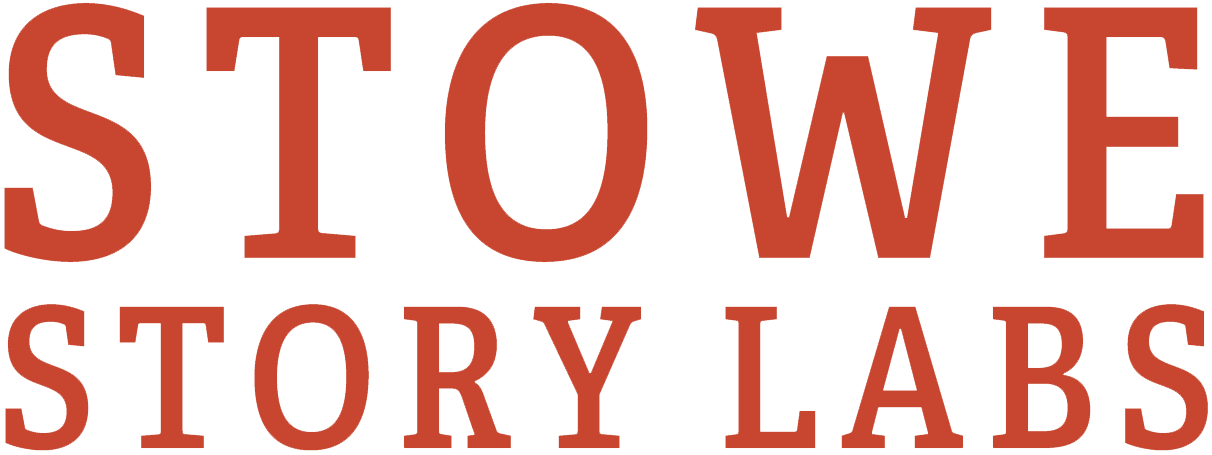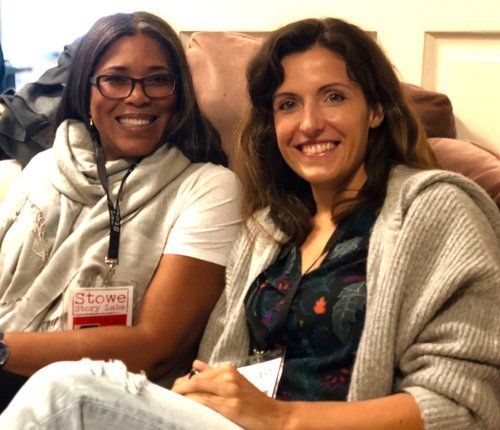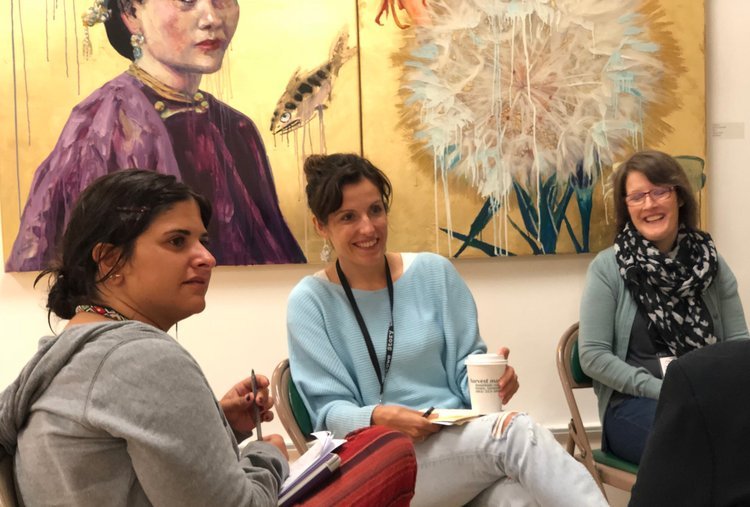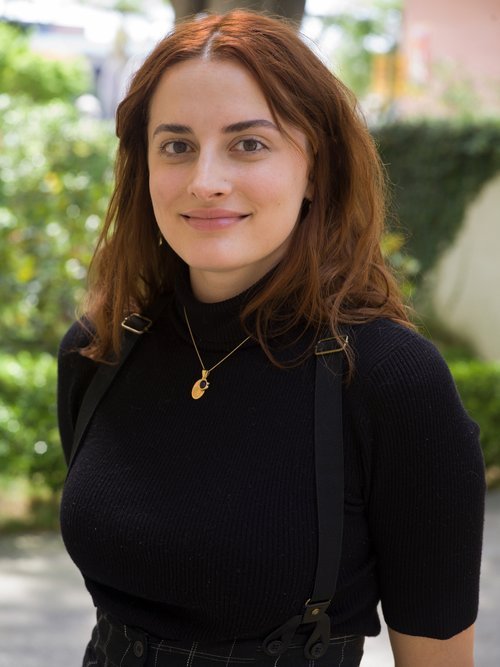Nurturing Visions
Stowe Mentor Novelist, Screenwriter, and TV Development Executive Eszter Angyalosy Talks About Her Journey to be a Writer and Nurturing Other Voices
By Marian Cook
Eszter at the 2018 Narrative Lab in Stowe, Vermont. Photo by Jesse Schloff
Eszter Angyalosy is no stranger to the industry. For years now, she’s racked up titles as a novelist, screenwriter, TV development executive at HBO Hungary, and she’s currently a treasured team member of Stowe Story Labs. For four years, she’s mentored countless participants and now she’s helming the inaugural Writers Room, where participants deconstruct a show—in this case, the wildly successful Amazon Prime show Bosch—and then collaborate to forge a new original story, pilot, and story bible as part of a working writers’ room. Along the way, she’s learned as much as she’s taught, balanced autonomy and collaboration, and found the time to develop her own stories as she helps nurture others’.
How long have you known you wanted to be a writer and how did you break into the industry?
Since I was a little kid, I wanted to be some sort of a professional storyteller: books, movies, theater—didn’t matter, I loved them all. The moment I learned how to read I fell in love with stories. I was only happy in fantasyland, that was my safe space, my escape. Then, I realized how much power stories have: they can literally change people’s lives—they changed mine. And I wanted to be able to give the same to others: I wanted to change their lives, to make the world better through stories. Then, growing up, I kind of lost my naive idealism…but I still believe in the power of stories. And I still think storytellers have a huge power, but also a huge responsibility in shaping our world.
I cannot tell you too much about breaking into the industry, though…Honestly, I still feel like I haven’t done it. I’ve always loved telling stories, and I could not imagine doing anything else, so I tried to grab every opportunity I came across to make a living out of it. In the beginning of my career, I was trying to please others, figuring out what kind of stories they’d like and tried to write those, but that didn’t work out. I had to understand, the only reasonable thing to do is to create stories I’m excited about and hope others will find them exciting as well. So far, this seems to work quite well.
Your first novel was Wonderland. What’s it about, what inspired it, and how long had you been working on it? Is Wonderland the kind of story you’re usually drawn towards?
The story is about two friends who dream about becoming rockstars. They form a band and start to climb the ladder. Their dream slowly starts to turn into reality, but through the journey they lose a bit of themselves—and the friendship. It takes place in the early 2000s, when the era of record labels was about to finish and YouTube started to take over their role. This was the period when the self-made generation started to learn how to create themselves. The two protagonists in Wonderland represent the “old-school” and the “new-school”: one of them is the talent waiting to be discovered, the other is the ambition without any kind of real quality to sell. They both need each other to create something outstanding, but their worldviews are incompatible.
I wrote the novel together with a musician friend of mine, Ákos Baranyai, who understands very well the music industry and in his teenage years went through very similar experiences as our protagonists. But I think, the core dilemma is not limited to the music industry: I think, most of us struggle to balance these two essential and conflicting qualities.
We worked on it for almost three years. It is a slow-burner, young-adult drama focusing on the emotional transformation of the protagonists—and this is absolutely my favorite kind of story! I think I love young-adult stories because this is the period in our lives, when we figure out who we want to be, and because of this, these stories tell us the most about the human nature.
Eszter with fellow Stowe Mentor, Creative Producer, and Executive Director of SAGindie Darrien Michele Gipson.
For seven years, you were Editor-in-Chief at a Hungarian publishing house and then joined HBO Hungary as a Development Editor in 2015. What was that transition like from print to screen?
It was pretty intense. In a very short period, I had to learn a lot. First, I had to learn what are the common things and what are the differences between the two formats—it is a big mistake to think they are interchangeable, although several dramaturgical elements do work the same way. I very soon discovered, I felt more comfortable and confident writing for the screen than working on novels—the format fits my thinking-process, my mindset much better. Although I really love experimenting with different kinds of storytelling, I think every writer has their own real strengths, and I felt pretty lucky when I discovered screenwriting, especially TV writing, might be mine.
I was quite surprised to discover that although the writing process is quite different, the two industries are very similar. In both, people are desperately trying to figure out what the next big blockbuster or trend will be, and in both industries, they are completely lost and insecure about how to do it.
Do you like development work as well as writing? If so, what do you like about it?
If I want to be very honest, not anymore…I absolutely love working on others’ stories: the moment I find my way into the story, when I figure out why I am excited about it, it becomes my mission to make every story as good as possible, no matter if it’s mine or others’. And I must admit, I can only work on stories I feel excited and passionate about. But in the past few years, most of my work was story editing—and when you work on others’ stories, you don’t have time to work on your own ones. And I do have a lot of stories I am eager to tell! So, I really need to find a better balance between the two activities.
In 2018, you left HBO Hungary to pursue your own writing career. Was that scary?
It was very scary! I think, I chose to become an editor in the first place because I wanted to work on stories, but I wasn’t confident enough to believe my stories can be interesting enough for others…And I really had to build up my confidence to believe leaving such a prestigious place can do any good to my career...But the thing is, when you work for somebody, you follow others’ visions and not yours, which is less risky, less responsibility, and a pretty good safety net in such an expensive and competitive industry…But I felt it was time for me to start testing my own vision about stories! I wanted to test if what I think about storytelling is valid. And so far, it seems it was worth taking the risk.
How did you make your way towards Stowe Story Labs? And why did you choose to be a Stowe Story Labs mentor?
Right before leaving HBO, I started to work as a mentor with a very big European story lab called Torino Film Lab. One of the founding mentors of Stowe, the wonderful David Rocchio, was a mentee of mine there. He must have liked working with me because he asked me to join the mentor team at one of the Stowe Narrative Labs. It was an intense, exciting, and fun experience. I immediately felt like a part of the team and I could totally relate to the mission of the two Davids. I felt really honored when they asked me to come back for the next lab, and the one after that…
You’re now leading Stowe Story Labs inaugural Writers Room. What’s that experience been like? Many say you learn by teaching, what have you learned from the participants and what do you hope the participants get out of the program?
The Writers Room is a super exciting experiment. It’s the fusion of two different ideas: the break-down and analysis of an existing TV show, followed by the simulation of an actual Writers Room where we attempt to create a new original TV concept with the participants.
When I found myself in the deep end at HBO and I had to learn everything about TV writing very fast, that was my method: I analyzed the hell out of shows I liked, and then I tried to implement what I learned in the Writers Room process—I found the experience not just extremely useful, but also very fun. So, I soon started to do it together with the writers I worked with, to establish a common language and an understanding of the basics of storytelling before starting the actual work together—and they also found this fun and useful.
Eszter mentoring at Stowe’s home, The Current, Stowe’s renowned Center for Contemporary Art
This is the first time, though, that we had the chance to test our findings and theories about the analyzed show with the actual creators: after spending 6 weeks working with the first season of the TV show Bosch, David Rocchio arranged a sit-down for us with Eric Overmyer and Pieter Jan Brugge, and we could ask them about everything we wanted to know about the actual process. It was an extremely valuable experience. I think you can learn so much by analyzing others’ works. But I not only learned from Bosch—and Pieter Jan and Eric—I absolutely learned a lot from the participants. It’s an amazing, smart, and talented group of people: all of them have a very unique skill set and life experiences, which helps me to discover new perspectives and improve my skills as a teacher and a writer as well!
Outside of Stowe, what are you currently working on?
Last summer, I directed my first short movie together with my husband, director-of-photography Dániel Szőke. It was a really fun project and an important experience. We worked with a very low budget, which meant a lot of struggling, but we worked with really incredible people—and it also gave me the rare opportunity to oversee the whole process, something I usually cannot do as a writer. We are about to finish post-production. It’s called Last Chance and it’s about a man in his fifties who decides now is the time for him to learn how to ride a longboard. He befriends a teenager who is willing to teach him. While training together, they learn from each other what it means to fight for the truly important things in their lives.
I really enjoyed directing, so I probably want to do it again soon…
I’m also working on a young-adult, comedy-drama series about a Mexican-Hungarian teenage girl who is forced to leave her home behind in LA and restart her life in Hungary with a family she doesn’t know but immediately hates—until she figures out the real reason why her father decided to bring her home so abruptly. The show is called Family and other Embarrassments, and with my company, Joyrider, we’ll start pitching it to Hungarian broadcasters in the following months.
I’ve also been working on a feature for a while now entitled Newstyle. The story is based on true events about an outcast, biracial kid living in Hungary in the 80s, who discovers breakdancing and through dancing, he finally finds his identity.
Marian Cook is a former journalist, Stowe Story Labs staff member, and current USC student pursuing an MFA in directing. She’s been published over a dozen times, covering topics from local news to federal healthcare legislation. Although she loves the world of journalism, having done documentaries on a range of topics from plastic surgery to segregation in the church, her real passion lies in narrative film. She one day hopes to be a writer-director and tell strong, female-led stories, especially that of Latinas. When she’s not filming, she likes to explore, listen to blues and jazz, brush up on her French, and absorb everything science fiction related. Learn more at http://mariandcook.weebly.com/. At Stowe Story Labs, Marian assists with all aspects of operations, writes for the newsletter, and assists with research and writing to support fundraising and communications about programs.




